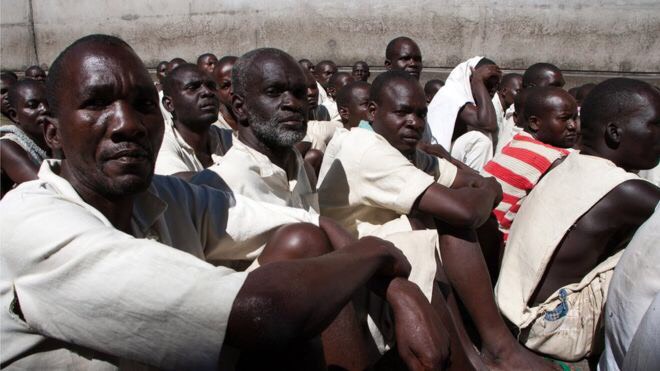- About
- Topics
- Story
- In-Depth
- Picks
- Opinion
- News
- Donate
- Signup for our newsletterOur Editors' Best Picks.Send
Read, Debate: Engage.
| May 15, 2020 | |
|---|---|
| topic: | Death Penalty |
| tags: | #Africa, #Coronavirus, #COVID-19, #Zimbabwe, #death penalty |
| located: | Zimbabwe |
| by: | Cyril Zenda |
“It is a miracle that I never expected,” said Dube after he – together with five others former death row prisoners – had been set free through an amnesty granted by President Emmerson Mnangagwa.
The six who unusually qualified for amnesty – all sentenced to death individually for separate murders – had each been locked up for at least 22 years. Before their release, the prisoners had had their death sentences commuted to life imprisonment. Under Zimbabwean law, murder is a specified crime, which means those convicted of it do not qualify for amnesty.
Considered a de facto abolitionist nation, Zimbabwe is on the road to abolish the death penalty. The southern African nation has not carried out any executions since 2005. At the end of 2019 the country had about 80 people on the death row.
In March President Mnangagwa commuted to life imprisonment the death sentences of all those convicts that had been on the death row for at least ten years.
The six ex-death row inmates were part of the over 4,000 prisoners who were granted amnesty as a move to de-congest the country’s 46 prisons, one of the measures being taken to control the spread of the deadly COVID-19 virus.
Among those that also expectedly benefited from this amnesty were all nursing mothers, a woman jailed for 50 years for a human trafficking crimes in which victims ended up being sex slaves in Kuwait, and another woman jailed after being found in possession of ivory.
The abolitionist Zimbabwean leader, himself being a former death row prisoner, is working on legal modalities to remove the death penalty from the country’s statute books altogether.
Opponents of the death penalty in Zimbabwe accused former president, the late Robert Mugabe, of using capital punishment as a handy weapon to cow political opponents. Mugabe and his supporters strongly opposed previous efforts to completely abolish capital punishment in the build-up to the promulgation of a new Constitution in 2013. Mnangagwa used to clash with his former boss, Mugabe, over the issue. Mnangagwa narrowly escaped the hangman’s noose in the 1960s on the technicality that he was below 21 years when his colleagues were hanged after they were caught while on a terrorist mission to sabotage infrastructure inside the then Rhodesia, as they fought against white colonial rule.
Results of a 2018 survey on public attitudes towards capital punishment showed that a majority of Zimbabweans were opposed to the death penalty.
According to the survey conducted by international criminologist, Dr Mai Sato, in collaboration with the Mass Public Opinion Institute, most Zimbabweans would be happy to see the abolition of capital punishment.
“When exploring the reasons behind the support for the death penalty, it was striking that the “eye for an eye” argument did not hold much traction with the Zimbabwean public,” said the survey’s report. “Only 14 percent of retentionists supported the death penalty for retributive reasons. Nor did the public think that the death penalty was an effective criminal justice policy, with 92 percent of the Zimbabweans favouring policies other than “more executions” for reducing violent crime rates.”
The survey was commissioned by Veritas Zimbabwe, a local legal and legislative watchdog that, for many years, has been campaigning for abolition of capital punishment in Zimbabwe.
When the issue of abolishing the death penalty was debated in Parliament in February this year, a majority of law makers supported the motion, with the few that opposed it demanding its retention especially for criminals such as machete killers and those who rape and kill children.
By copying the embed code below, you agree to adhere to our republishing guidelines.
